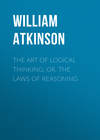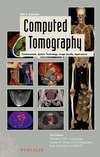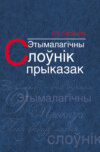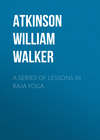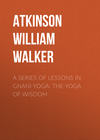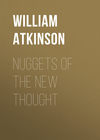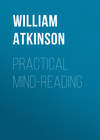Kitabı oku: «The Art of Logical Thinking; Or, The Laws of Reasoning», sayfa 7
CHAPTER XVII.
VARIETIES OF SYLLOGISMS
The authorities in Logic hold that with the four kinds of propositions grouped in every possible order of arrangement, it is possible to form nineteen different kinds of valid arguments, which are called the nineteen moods of the syllogism. These are classified by division into what are called the four figures, each of which figures may be known by the position of the middle term in the premises. Logicians have arranged elaborate and curious tables constructed to show what kinds of propositions when joined in a particular order of arrangement will make sound and valid syllogisms. We shall not set forth these tables here, as they are too technical for a popular presentation of the subject before us, and because they are not necessary to the student who will thoroughly familiarize himself with the above stated Laws of the Syllogism and who will therefore be able to determine in every case whether any given argument is a correct syllogism, or otherwise.
In many instances of ordinary thought and expression the complete syllogistic form is omitted, or not stated at full length. It is common usage to omit one premise of a syllogism, in ordinary expression, the missing premise being inferred by the speaker and hearer. A syllogism with one premise unexpressed is sometimes called an Enthymene, the term meaning "in the mind." For instance, the following: "We are a free people, therefore we are happy," the major premise "All free people are happy" being omitted or unexpressed. Also in "Poets are imaginative, therefore Byron was imaginative," the minor premise "Byron was a poet" is omitted or unexpressed. Jevons says regarding this phase of the subject: "Thus in the Sermon on the Mount, the verses known as the Beatitudes consist each of one premise and a conclusion, and the conclusion is put first. 'Blessed are the merciful: for they shall obtain mercy.' The subject and the predicate of the conclusion are here inverted, so that the proposition is really 'The merciful are blessed.' It is evidently understood that 'All who shall obtain mercy are blessed,' so that the syllogism, when stated at full length, becomes: 'All who shall obtain mercy are blessed; All who are merciful shall obtain mercy; Therefore, all who are merciful are blessed.' This is a perfectly good syllogism."
Whenever we find any of the words: "because, for, therefore, since," or similar terms, we may know that there is an argument, and usually a syllogism.
We have seen that there are three special kinds of Propositions, namely, (1) Categorical Propositions, or propositions in which the affirmation or denial is made without reservation or qualification; (2) Hypothetical Propositions, in which the affirmation or denial is made to depend upon certain conditions, circumstances, or suppositions; and (3) Disjunctive Propositions, in which is implied or asserted an alternative.
The forms of reasoning based upon these three several classes of propositions bear the same names as the latter. And, accordingly the respective syllogisms expressing these forms of reasoning also bear the class name or term. Thus, a Categorical Syllogism is one containing only categorical propositions; a Hypothetical Syllogism is one containing one or more hypothetical propositions; a Disjunctive Syllogism is one containing a disjunctive proposition in the major premise.
Categorical Syllogisms, which are far more common than the other two kinds, have been considered in the previous chapter, and the majority of the examples of syllogisms given in this book are of this kind. In a Categorical Syllogism the statement or denial is made positively, and without reservation or qualification, and the reasoning thereupon partakes of the same positive character. In propositions or syllogisms of this kind it is asserted or assumed that the premise is true and correct, and, if the reasoning be logically correct it must follow that the conclusion is correct, and the new proposition springing therefrom must likewise be Categorical in its nature.
Hypothetical Syllogisms, on the contrary, have as one or more of their premises a hypothetical proposition which affirms or asserts something provided, or "if," something else be true. Hyslop says of this: "Often we wish first to bring out, if only conditionally, the truth upon which a proposition rests, so as to see if the connection between this conclusion and the major premise be admitted. The whole question will then depend upon the matter of treating the minor premise. This has the advantage of getting the major premise admitted without the formal procedure of proof, and the minor premise is usually more easily proved than the major. Consequently, one is made to see more clearly the force of the argument or reasoning by removing the question of the material truth of the major premise and concentrating attention upon the relation between the conclusion and its conditions, so that we know clearly what we have first to deny if we do not wish to accept it."
By joining a hypothetical proposition with an ordinary proposition we create a Hypothetical Proposition. For instance: "If York contains a cathedral it is a city; York does contain a cathedral; therefore, York is a city." Or: "If dogs have four feet, they are quadrupeds; dogs do have four feet; therefore dogs are quadrupeds." The Hypothetical Syllogism may be either affirmative or negative; that is, its hypothetical proposition may either hypothetically affirm or hypothetically deny. The part of the premise of a Hypothetical Syllogism which conditions or questions (and which usually contains the little word "if") is called the Antecedent. The major premise is the one usually thus conditioned. The other part of the conditioned proposition, and which part states what will happen or is true under the conditional circumstances, is called the Consequent. Thus, in one of the above examples: "If dogs have four feet" is the Antecedent; and the remainder of the proposition: "they are quadrupeds" is the Consequent. The Antecedent is indicated by the presence of some conditional term as: if, supposing, granted that, provided that, although, had, were, etc., the general sense and meaning of such terms being that of the little word "if." The Consequent has no special indicating term.
Jevons gives the following clear and simple Rules regarding the Hypothetical Syllogism:
I. "If the Antecedent be affirmed, the consequent may be affirmed. If the Consequent be denied, the Antecedent may be denied."
II. "Avoid the fallacy of affirming the consequent, or denying the antecedent. This is a fallacy because of the fact that the conditional statement made in the major premise may not be the only one determining the consequent." The following is an example of "Affirming the Consequent: " "If it is raining, the sky is overclouded; the sky is overclouded; therefore, it is raining." In truth, the sky may be overclouded, and still it may not be raining. The fallacy is still more apparent when expressed in symbols, as follows: "If A is B, C is D; C is D; therefore, A is B." The fallacy of denying the Antecedent is shown by the following example: "If Radium were cheap it would be useful; Radium is not cheap; therefore Radium is not useful." Or, expressed in symbols: "If A is B, C is D; A is not B; therefore C is not D." In truth Radium may be useful although not cheap. Jevons gives the following examples of these fallacies: "If a man is a good teacher, he thoroughly understands his subject; but John Jones thoroughly understands his subject; therefore, he is a good teacher." Also, "If snow is mixed with salt it melts; the snow on the ground is not mixed with salt; therefore it does not melt."
Jevons says: "To affirm the consequent and then to infer that we can affirm the antecedent, is as bad as breaking the third rule of the syllogism, and allowing an undistributed middle term… To deny the antecedent is really to break the fourth rule of the syllogism, and to take a term as distributed in the conclusion which was not so in the premises."
Hypothetical Syllogisms may usually be easily reduced to or converted into Categorical Syllogisms. As Jevons says: "In reality, hypothetical propositions and syllogisms are not different from those which we have more fully considered. It is all a matter of the convenience of stating the propositions." For instance, instead of saying: "If Radium were cheap, it would be useful," we may say "Cheap Radium would be useful;" or instead of saying: "If glass is thin, it breaks easily," we may say "Thin glass breaks easily." Hyslop gives the following Rule for Conversion in such cases: "Regard the antecedent of the hypothetical proposition as the subject of the categorical, and the consequent of the hypothetical proposition as the predicate of the categorical. In some cases this change is a very simple one; in others it can be effected only by a circumlocution."
The third class of syllogisms, known as The Disjunctive Syllogism, is the exception to the law which holds that all good syllogisms must fit in and come under the Rules of the Syllogism, as stated in the preceding chapter. Not only does it refuse to obey these Rules, but it fails to resemble the ordinary syllogism in many ways. As Jevons says: "It would be a great mistake to suppose that all good logical arguments must obey the rules of the syllogism, which we have been considering. Only those arguments which connect two terms together by means of a middle term, and are therefore syllogisms, need obey these rules. A great many of the arguments which we daily use are of this nature; but there are a great many other kinds of arguments, some of which have never been understood by logicians until recent years. One important kind of argument is known as the Disjunctive Syllogism, though it does not obey the rules of the syllogism, or in any way resemble syllogisms."
The Disjunctive Syllogism is one having a disjunctive proposition in its major premise. The disjunctive proposition also appears in the conclusion when the disjunction in the major premise happens to contain more than two terms. A disjunctive proposition, we have seen, is one which possesses alternative predicates for the subject in which the conjunction "or" (sometimes accompanied by "either") appears. As for instance: "Lightning is sheet or forked;" or, "Arches are either round or pointed;" or, "Angles are either obtuse, or right angled, or acute." The different things joined together by "or" are called Alternatives, the term indicating that we may choose between the things, and that if one will not answer our purpose we may take the other, or one of the others if there be more than one other.
The Rule regarding the Use of Disjunctive Syllogisms is that: "If one or more alternatives be denied, the rest may still be affirmed." Thus if we say that "A is B or C," or that "A is either B or C," we may deny the B but still affirm the C. Some authorities also hold that "If we affirm one alternative, we must deny the remainder," but this view is vigorously disputed by other authorities. It would seem to be a valid rule in cases where the term "either" appears as: "A is either B or C," because there seems to be an implication that one or the other alone can be true. But in cases like: "A is B or C," there may be a possibility of both being true. Jevons takes this latter view, giving as an example the proposition: "A Magistrate is a Justice-of-the-Peace, a Mayor, or a Stipendiary Magistrate," but it does not follow that one who is a Justice-of-the-Peace may not be at the same time a Mayor. He states: "After affirming one alternative we can only deny the others if there be such a difference between them that they could not be true at the same time." It would seem that both contentions are at the same time true, the example given by Jevons illustrating his contention, and the proposition "The prisoner is either guilty or innocent" illustrating the contentions of the other side.
A Dilemma is a conditional syllogism whose Major Premise presents some sort of alternative. Whately defines it as: "A conditional syllogism with two or more antecedents in the major, and a disjunctive minor." There being two mutually exclusive propositions in the Major Premise, the reasoner is compelled to admit one or the other, and is then caught between "the two horns of the dilemma."
CHAPTER XVIII.
REASONING BY ANALOGY
What is called Reasoning by Analogy is one of the most elementary forms of reasoning, and the one which the majority of us most frequently employ. It is a primitive form of hasty generalization evidencing in the natural expectation that "things will happen as they have happened before in like circumstances." The term as used in logic has been defined as "Resemblance of relations; Resemblances of any kind on which an argument falling short of induction may be founded." Brooks says: "Analogy is that process of thought by which we infer that if two things resemble each other in one or more particulars, they will resemble each other in some other particular."
Jevons states the Rule for Reasoning by Analogy, as follows: "If two or more things resemble each other in many points, they will probably resemble each other also in more points." Others have stated the same principle as follows: "When one thing resembles another in known particulars, it will resemble it also in the unknown;" and "If two things agree in several particulars, they will also agree in other particulars."
There is a difference between generalization by induction, and by analogy. In inductive generalization the rule is: "What is true of the many is true of all;" while the rule of analogy is: "things that have some things in common have other things in common." As Jevons aptly remarks: "Reasoning by Analogy differs only in degree from that kind of reasoning called 'Generalization.' When many things resemble each other in a few properties, we argue about them by Generalization. When a few things resemble each other in many properties, it is a case of analogy." Illustrating Analogy, we may say that if in A we find the qualities, attributes or properties called a, b, c, d, e, f, g, respectively, and if we find that in B the qualities, etc., called a, b, c, d, e, respectively, are present, then we may reason by analogy that the qualities f and g must also belong to B.
Brooks says of this form of reasoning: "This principle is in constant application in ordinary life and in science. A physician, in visiting a patient, says this disease corresponds in several particulars with typhoid fever, hence it will correspond in all particulars, and is typhoid fever. So, when the geologist discovers a fossil animal with large, strong, blunt claws, he infers that it procured its food by scratching or burrowing in the earth. It was by analogy that Dr. Buckland constructed an animal from a few fossil bones, and when subsequently the bones of the entire animal were discovered, his construction was found to be correct." Halleck says: "In argument or reasoning we are much aided by the habit of searching for hidden resemblances… The detection of such a relation cultivates thought. If we are to succeed in argument, we must develop what some call a sixth sense of such relations… The study of poetry may be made very serviceable in detecting analogies and cultivating the reasoning powers. When the poet brings clearly to mind the change due to death, using as an illustration the caterpillar body transformed into the butterfly spirit, moving with winged ease over flowering meadows, he is cultivating our apprehension of relations, none the less valuable because they are beautiful."
But the student must be on guard against the deceptive conclusions sometimes arising from Reasoning by Analogy. As Jevons says: "In many cases Reasoning by Analogy is found to be a very uncertain guide. In some cases unfortunate mistakes are made. Children are sometimes killed by gathering and eating poisonous berries, wrongly inferring that they can be eaten, because other berries, of a somewhat similar appearance, have been found agreeable and harmless. Poisonous toadstools are occasionally mistaken for mushrooms, especially by people not accustomed to gathering them. In Norway mushrooms are seldom seen, and are not eaten; but when I once found a few there and had them cooked at an inn, I was amused by the people of the inn, who went and collected toadstools and wanted me to eat them also. This was clearly a case of mistaken reasoning by analogy. Even brute animals reason in the same way in some degree. The beaten dog fears every stick, and there are few dogs which will not run away when you pretend to pick up a stone, even if there be no stone to pick up." Halleck says: "Many false analogies are manufactured, and it is excellent thought training to expose them. The majority of people think so little that they swallow these false analogies just as newly fledged robins swallow small stones dropped into their open mouths… This tendency to think as others do must be resisted somewhere along the line, or there can be no progress." Brooks says: "The argument from Analogy is plausible, but often deceptive. Thus to infer that since American swans are white, the Australian swan is white, gives a false conclusion, for it is really black. So to infer that because John Smith has a red nose and is a drunkard, then Henry Jones who also has a red nose is also a drunkard, would be a dangerous inference… Conclusions of this kind drawn from analogy are frequently fallacious."
Regarding the Rule for Reasoning from Analogy, Jevons says: "There is no way in which we can really assure ourselves that we are arguing safely by analogy. The only rule that can be given is this; that the more closely two things resemble each other, the more likely it is that they are the same in other respects, especially in points closely connected with those observed… In order to be clear about our conclusions, we ought in fact never to rest satisfied with mere analogy, but ought to try to discover the general laws governing the case. In analogy we seem to reason from one fact to another fact without troubling ourselves either with deduction or induction. But it is only by a kind of guess that we do so; it is not really conclusive reasoning. We ought properly to ascertain what general laws of nature are shown to exist by the facts observed, and then infer what will happen according to these laws… We find that reasoning by analogy is not to be depended upon, unless we make such an inquiry into the causes and laws of the things in question, that we really employ inductive and deductive reasoning."
Along the same lines, Brooks says: "The inference from analogy, like that from induction, should be used with caution. Its conclusion must not be regarded as certain, but merely as reaching a high degree of probability. The inference from a part to a part, no more than from a part to the whole, is attended with any rational necessity. To attain certainty, we must show that the principles which lie at the root of the process are either necessary laws of thought or necessary laws of nature; both of which are impossible. Hence analogy can pretend to only a high degree of probability. It may even reach a large degree of certainty, but it never reaches necessity. We must, therefore, be careful not to accept any inference from analogy as true until it is proved to be true by actual observation and experiment, or by such an application of induction as to remove all reasonable doubt."
CHAPTER XIX.
FALLACIES
A Fallacy is: "An unsound argument or mode of arguing, which, while appearing to be decisive of a question, is in reality not so; an argument or proposition apparently sound, but really fallacious; a fallacious statement or proposition, in which the error is not apparent, and which is therefore likely to mislead or deceive; sophistry."
In Deductive Reasoning, we meet with two classes of Fallacies; namely, (1) Fallacious Premise; and (2) Fallacious Conclusion. We shall now consider each of these in turn.
Fallacious Premise is in effect an unwarranted assumption of premises. One of the most common forms of this kind of Fallacy is known as "Begging the Question," the principle of which is the assumption of a fundamental premise which is not conceded; the unwarrantable assumption of that which is to be proved; or the assumption of that by which it is to be proved, without proving it. Its most common form is that of boldly stating some unproven fact, authoritatively and positively, and then proceeding to use the statement as the major premise of the argument, proceeding logically from that point. The hearer perceiving the argument proceeding logically often fails to remember that the premise has been merely assumed, without warrant and without proof and omitting the hypothetical "if." One may proceed to argue logically from the premise that "The moon is made of green cheese," but the whole argument is invalid and fallacious because of the fact that the person making it has "begged the question" upon an unwarranted premise. Hyslop gives a good example of this form of fallacy in the case of the proposition "Church and State should be united." Proof being demanded the advocate proceeds to "beg the question" as follows: "Good institutions should be united; Church and State are good institutions; therefore, Church and State should be united." The proposition that "Good institutions should be united" is fallacious, being merely assumed and not proven. The proposition sounds reasonable, and few will feel disposed to dispute it at first, but a little consideration will show that while some good institutions may well be united, it is not a general truth that all should be so.
"Begging the Question" also often arises from giving a name to a thing, and then assuming that we have explained the thing. This is a very frequent practice with many people – they try to explain by merely applying names. An example of this kind is had in the case of the person who tried to explain why one could see through a pane of glass by saying "because it is transparent." Or when one explains that the reason a certain substance breaks easily is "because it is brittle." Moliere makes the father of a dumb girl ask why his daughter is dumb. The physician answers: "Nothing is more easy than to explain it; it comes from her having lost the power of speech." "Yes, yes," objects the father, "but the cause, if you please, why she has lost the power of speech." The physician gravely replies: "All our best authors will tell you that it is the impeding of the action of the tongue."
Jevons says: "The most frequent way, perhaps, in which we commit this kind of fallacy is to employ names which imply that we disapprove of something, and then argue that because it is such and such, it must be condemned. When two sportsmen fall out in some manner relating to the subject of game, one will, in all probability, argue that the act of the other was 'unsportsmanlike,' and therefore should not have been done. Here is to all appearance a correct syllogism:
"No unsportsmanlike act should be done; John Robinson's act was unsportsmanlike: Therefore, John Robinson's act should not have been done.
"This is quite correct in form; but it is evidently the mere semblance of an argument. 'Unsportsmanlike' means what a sportsman should not do. The point to be argued was whether the act fell within the customary definition of what was unsportsmanlike."
Arising from "Begging the Question," and in fact a class of the latter, is what is called "Reasoning in a Circle." In this form of fallacy one assumes as proof of a proposition the proposition itself; or, uses the conclusion to prove the premise. For instance: "This man is a rascal because he is a rogue; and he is a rogue because he is a rascal." Or, "It is warm because it is summer; and it is summer because it is warm." Or "He never drinks to excess, because he is never intemperate in drinking."
Brooks says: "Thus to argue that a party is good because it advocates good measures, and that certain measures are good because they are advocated by so excellent a party, is to reason in a circle. So when persons argue that their church is the true one, because it was established by God, and then argue that since it is the true church it must have been founded by God, they fall into this fallacy. To argue that 'the will is determined by the strongest motive' and to define the strongest motive as 'that which influences the will,' is to revolve in a circle of thought and prove nothing. Plato commits this error when he argues the immortality of the soul from its simplicity, and afterwards attempts to prove its simplicity from its immortality." It needs care to avoid this error, for it is surprising how easily one falls into it. Hyslop says: "The fallacy of Reasoning in a Circle occurs mostly in long arguments where it can be committed without ready detection… When it occurs in a long discourse it may be committed without easy discovery. It is likely to be occasioned by the use of synonyms which are taken to express more than the conception involved when they do not." What is called a Vicious Circle is caused when the conclusion of one syllogism is used for a proposition in another syllogism, which in its turn comes to be used as a basis for the first or original syllogism.
Fallacious Conclusion is in effect an unwarranted or irrelevant assumption of a logical conclusion. There are many forms of this fallacy among which are the following:
Shifting ground, which consists in the pretence of proving one thing while in reality merely a similar or related thing is being proved. In this class is the argument that because a man is profane he must necessarily be dishonest; or that because a man denies the inspiration of the Scriptures he must be an atheist.
Fallacious Questioning, in which two or more related questions are asked, and the answer of one is then applied to the other. For instance: "You assert that the more civilized a community, the more silk-hats are to be found in it?" "Yes." "Then, you state that silk-hats are the promoters and cause of civilization in a community?" A question of this kind is often so arranged that an answer either in the affirmative or the negative will lead to a false or fallacious inference. For instance, the question once asked a respectable citizen on the witness stand: "Have you stopped beating your mother?" An answer of either "Yes" or "No," was out of the question, for it would have placed the witness in a false position, for he had never beaten his mother, nor been accused of the same.
Partial Proof, in which the proof of a partial or related fact is used to infer a proof of the whole fact or a related one. For instance, it is fallacious to argue that a man has been guilty of drunkenness by merely proving that he was seen entering a saloon.
Appeal to Public Opinion, in which the prejudices of the public are appealed to rather than its judgment or reason. In politics and theological argument this fallacy is frequent. It is no argument, and is reprehensible.
Appeal to Authority, or Reverence, in which the reverence and respect of the public for certain persons is used to influence their feelings in place of their judgment or reason. For instance: "Washington thought so-and-so, and therefore it must be right;" or "It is foolish to affirm that Aristotle erred;" or "It has been believed by men for two thousand years, that, etc;" or "What our fathers believed must be true." Appeals of this kind may have their proper place, but they are fallacies nevertheless, and not real argument.
Appeal to Profession, in which an appeal is made to practices, principles or professions of the opponent, rather than to reason or judgment. Thus we may argue that a certain philosophy or religion cannot be sound or good, because certain people who hold it are not consistent, or not worthy, moral or sober. This argument is often used effectively against an opponent, and is valid against him personally. But it is no valid argument against his philosophy or belief, because he may act in violation of them, or he may change his practices and still adhere to his beliefs – the two are not joined.
Appeal to General Belief, in which an appeal is made to general or universal belief, although the same may be unsupported by proof. This is quite common, but is no real argument. The common opinion may be erroneous, as history proves. A few centuries ago this argument could have been used in favor of the earth being flat, etc. A half-century ago it was used against Darwin. Today it is being used against other new ideas. It is a fallacy by its very nature.
Appeal to Ignorance, in which an appeal is made to the ignorance of the opponent that his conviction may follow from his inability to prove the contrary. It is virtually no argument that: "So-and-so must be true, because you cannot prove that it is not." As Brooks says: "To argue that there is no material world, because we cannot explain how the mind knows it to exist, is the celebrated fallacy of Hume in philosophy. The fact that we cannot find a needle in a haystack is no proof that it is not there."
Introduction of New Matter, also called Non Sequitur, in which matter is introduced into the conclusion that is not in the premises. Hyslop gives the following example of it: "All men are rational; Socrates is a man; therefore, Socrates is noble." De Morgan gives the following more complex example: "Episcopacy is of Scripture origin; The Church of England is the only Episcopal church in England; therefore, the church established is the church that ought to be supported."
Other fallacies, resembling in some respects those above mentioned, are as follows:
Fallacy of Ambiguous Terms, in which different meanings of the same word are used to produce the fallacious argument. As Jevons says: "A word with two distinct meanings is really two words."
